
Local SEO Mistakes Hotels Make
The global hotel business is experiencing a rare boom in sales due to the sudden rise in the number of travelers now. Hence, the hotel business has an open yet competitive market.
Take a look at the below graph showing how rapidly world tourism is growing.
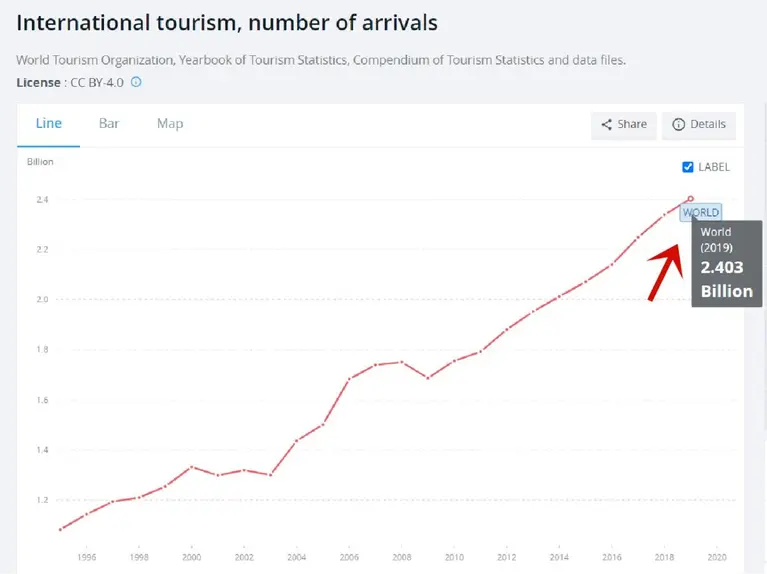
Hotel owners are experimenting with different SEO techniques to maximize their online visibility and sales. But they tend to neglect the critical aspects of running a successful SEO campaign. These mistakes might seem subtle, but they come with a hefty price for any hotel business.
In this article, we will be discussing common SEO mistakes that hotel owners are making. We will also discuss tips and tools to rectify those mistakes and run a successful SEO campaign.
Read: Local SEO Tips For Hotels
14 Local SEO Mistakes Costing Your Hotel Business
1. No Google My Business Profile
Many hotel owners make the simple but costly error of creating a GMB profile for their company and then leaving it dormant. In more ways than one, a dormant GMB profile of a hotel can affect your online reputation and rankings. Let's have a look at how this is done.
- Your hotel's dormant GMB listing may mislead potential customers.
- A stationary GMB profile might detract your target audience from ever reaching your hotel's website.
- A dormant listing can result in a suspension from Google.
- A dormant GMB profile will cause your hotel to be ranked lower by Google.
What are the solutions?
- Update your GMB profile with customer-relevant information about your hotel and services. Here’s an example:

- Clearly state the hotel's name, address, and phone number, as well as its hours of operations.
- Maintain the portion of the GMB profile of your hotel dedicated to reviews.
Read: Step-by-step Setup Guide for Google My Business Set up
2. Local Listings with Inconsistent Business Information
Inconsistent business information might not seem like a blunder, but it is one. When you list your hotel on public directories, your brand is exposed to your target audience in the market.
If your audience notices inconsistent or irrelevant information on those listings, they will question your hotel's credibility.
Take a look at Brightlocal’s survey on users' feelings about it.

So how can we maintain consistency with local listings?
- Maintain similar descriptions throughout multiple directory listings of your hotel/s.
- Update your NAP, business hours, and other relevant information for all the local listings.
- Use tools from Changescape Web to manage and modify all the local listings of your hotels in one place.
Hotels with consistent business information on their directory listings perform better in the market.
Consistent business information across online platforms drives organic traffic to your business website and popularizes your hotel. Your hotel will be ranked higher on the SERPs due to consistent business information on your local listings.
3. Unclaimed or Outdated Local Listings
Google's search engine algorithm frequently flags unclaimed business profiles as spam. Google would speed up the indexing process if you claimed your hotel listing.
If your hotel is well-categorized and claimed, the search engine algorithm will prioritize it to rank higher on the SERPs.
So, what does it mean if you don't claim your hotel’s local listings?
- Unclaimed hotel listings are frequently banned from appearing in Google's local SERPs.
- Unclaimed hotel listings are frequently taken away by a competitor wanting to build a name for itself in the market.
- Unclaimed hotel listings negatively influence brand value, reputation, and on-site engagement.
So, how do you claim your hotel listing(s)?
- After you've listed your business on Google My Business, claim it. It builds trust and credibility among the audience as well as search engines.
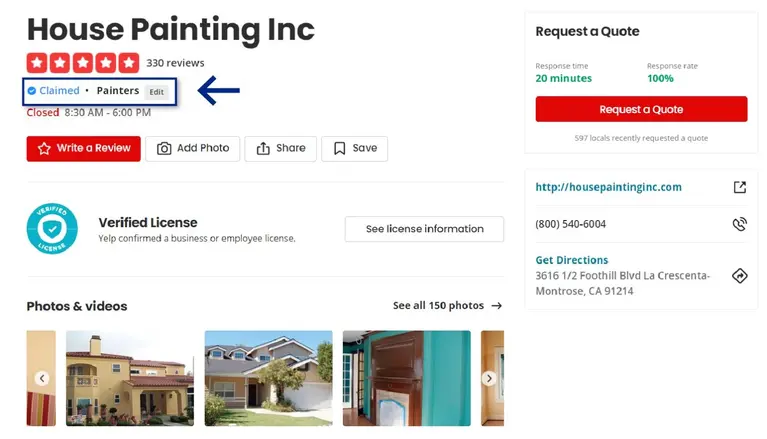
- Go to your hotel’s GMB profile's Knowledge Panel and select the 'Own This Business' option. Make sure to complete all of the steps.
4. Missing NAP Details on Local Listings
Hotel owners are often seen making the mistake of providing inconsistent contact information about their hotel business. Inconsistent and missing NAP details on your local listings can hamper your market visibility and rankings big time.
Name, Address, and Phone Number (NAP) is an acronym for Name, Address, and Phone Number. Your hotel listing’s NAP is the information that allows others to contact you and do business with you. Inconsistent NAP information on your hotel listings can deceive Google and your visitors.
You can use free tools like Brightlocal or Mozlocal to find inconsistent NAP details. Just enter accurate NAP, and it’ll fetch you incorrect listings.

Let's look at how conflicting NAP information affects your hotel business.
- Inconsistent or missing NAP details on your hotel’s online profiles will hurt your SERP rankings.
- Unreliable NAP information can hurt your consumer outreach and sales efforts.
- Missing NAP information can harm your hotel's internet reputation.
As a result, it's critical to keep up-to-date local listings of your hotel with accurate NAP information.
5. Inconsistent or Missing Location Information on Local Listings
Provide your business location details to your hotel’s website visitors if you want them to do business with you.
Missing or erroneous location information can cost your hotel a lot in sales and client engagement. Before indexing a business for ranking, Google's search engine algorithm frequently evaluates its location across several platforms.
This is why businesses should ensure that while listing the business, they need to pinpoint their location accurately, as shown in the example below. It’s because search engines use local searches, and audiences use them to find the directions.

So, what happens if the location information in your hotel listings is inaccurate or missing?
- Google's search engine algorithm may devalue your hotel’s local listing by failing to rank it.
- No one would be able to find your hotel. As a result, there is less crowd drive and fewer sales.
How can you get more people to come to your physical location and visit your business website?
- Include a Google map link to your hotel’s location with an address to all the local listings.
- In the location column of your hotel’s GMB profile, include simple directions and nearby landmarks.
Read: What are the Benefits of a Google My Business Listing?
6. Missing Title Tags and Meta Descriptions
Take a look at this example of how a hotel used title and meta description for their site. You can check other competitors using the free Mozbar extension.

The title is everything for a business and especially for hotels. The title symbolizes what your brand stands from. A relevant and appealing title should drive more crowd and sales to your hotel than an irrelevant one.
Missing titles and meta-description lowers your credibility in the market.
When a user searches for a hotel in your locality, your hotel's title and meta-descriptions come first on the SERPs.
A meta-description is that short and crisp summary of your business under the title tag of your business listings on SERPs. Missing meta-descriptions hurt your visitors' purchase intents.
Let's look at some of the tips to improve the meta-description and title tags of your hotel's local listings.
- Invest your creativity and market analysis in developing a catchy yet relevant business name for your hotel.
- Use free tools from Kayak Marketing to improve your page title and meta-description.
7. Neglecting Blogging On-site
On-site blogging has been neglected by many amateur digital marketers and hotel owners. Blogging is not a thing of the past.
Neglecting to blog is neglecting user engagement on-site and website uptime. Neglecting on-site blogging can cost your hotel business big time.
Producing quality content on-site has significant benefits. Quality blog content can improve your on-site user engagement. It will also land your hotel website higher on the SERPs.
Relevant and engaging content on-site authenticates your position as a leading hotel in the market. Although Mariott is a well-known brand, they still produce content to keep their game on top. Take a look at this screenshot.
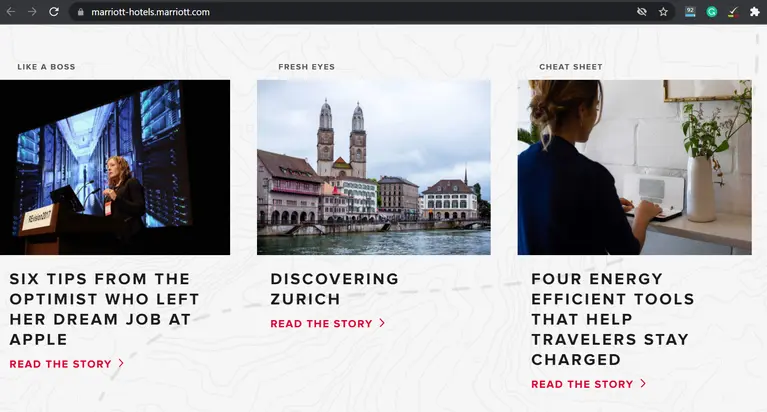
Let’s look at some of the tools to up the on-site blogging game for your hotel website.
- Sumo is one of the most efficient and easy-to-use blogging tools out there. It provides you with email capture forms and blog analytics tools.
- Sendinblue is a versatile blogging tool for digital marketing and local search optimization. This tool enables you to use heat maps and real-time statistics for your business blog.
8. Irrelevant or Missing Keywords Related to Your Hotel
Irrelevant keyword strategy is one of the blunders that hotel owners are making. If you are in the hotel business, then a solid keywords strategy could accelerate your growth as a brand in the market.
Your market rankings and online visibility could hit the lowest without any proper keywords strategy for your hotel business website.
Let’s understand keywords and strategize them better for your hotel business.
Keywords are divided into two categories: those with a purchase purpose and those with a research goal. Buying intent keywords are straightforward and reveal the user's desire to check out your hotel.
For example, take a look at the below keywords in the screenshot:

The research purpose keywords are ambiguous, implying that the user is only interested in hotels and has not yet decided whether or not to stay in them.
- Use Google's free Keyword Planner. It's one of the most efficient and cost-effective ways to plan your business's keyword strategy.
- Semrush can help you find high-volume long-tail keywords. It will benefit your hotel's website.
Read: Common Keyword Research Mistakes People Often Do In SEO
9. No External Links or Citations
Online mentions can skyrocket your hotel's ranking on the SERPs.
External links and citations from hotel websites with high domain authority help your hotel's brand reputation. You can acquire high-quality backlinks from guest blogging on one of the leading hotel chain's websites.
People, for example, browse through a plethora of information regarding traveling and vacations every second.
To expand your hotel business's exposure, guest blog on one of the most popular travel blogs or websites. You must have inbound links from reliable and high-traffic websites for better market rankings.
You can find these blogs by using certain keywords such as “hotel + submit guest posts”, “hotel + write for us”, “travel + contribute blogs”, etc. Take a look at the below screenshot showing it.
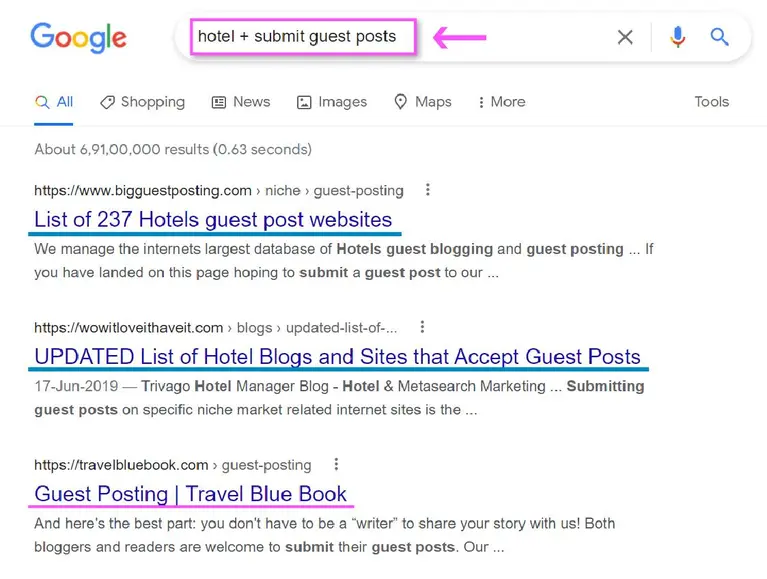
Let’s look at some of the tools to manage the backlinks on your hotel website.
- Monitor your competitors' links with tools like Moz Link Explorer. It will give you a good notion of areas you need to work on.
- Linkody is one of the most affordable solutions for keeping track of your competition. When your competitors get a new backlink, Linkody will notify you.
Read: Simple Tips To Build Local Citations
10. No Internal Linking or On-page SEO
Business owners are missing out on some serious boost in conversion rate on-site by neglecting the power of internal linking. Hotel websites with few or no internal links tend to convert fewer customers than websites with more internal links.
Login to Google search console. You can check for the links option on the left that shows whether or not your pages have a good number of internal links.
Take a look t this screenshot showing number of internal links the pages have:
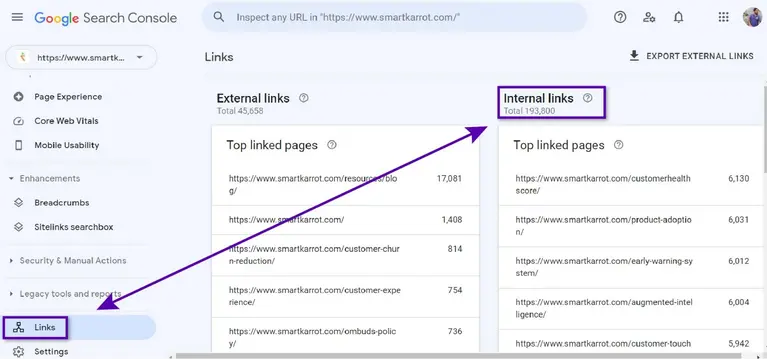
Internal linking enhances the benefits that external links provide to the overall growth of your hotel's website! Someone who comes across your hotel listing might be interested in learning more about it.
Internal linking will then assist users in obtaining the information they require on your hotel website. It will increase the uptime of your website. More engagement implies more time spent on your website.
Let’s look at some of the tools to manage all the internal linking on your hotel website.
- Create clever and relevant internal linking with Link Whisper to engage more visitors.
- Manage all of your internal links on the hotel website with Interlinks Manager.
11. Your Hotel is Indexed Under Irrelevant or Multiple Business Categories
The importance of a category in Google's ranking of a business cannot be overstated. If you are in the hotel business, then rankings are all that matters.
When Google's search engine algorithm scans a hotel listing, it looks for similar categories. If your hotel is uncategorized or is categorized in the wrong categories, Google will mark it under an ambiguous category.
So, what happens if your hotel listing is uncategorized or is included in many categories?
- Your hotel listing may be classified as spam or uncategorized businesses by Google.
- Google may not rank your hotel listing at all.
- Uncategorized hotels or hotels grouped under many categories may mislead your potential customers.
What are the solutions?
- After obtaining your hotel’s GMB listing under the relevant business listing after obtaining it.
- Sort your hotel into relevant business categories.
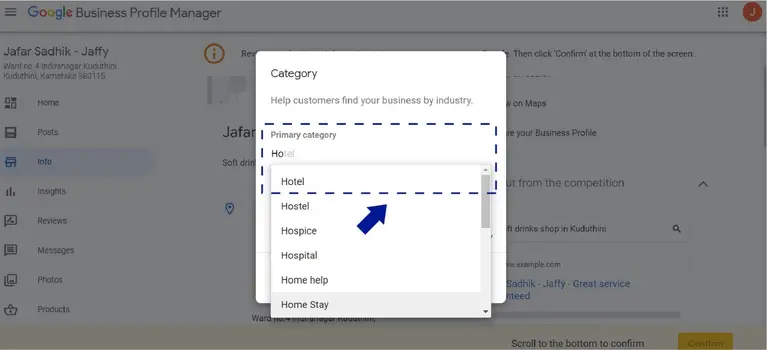
For example, look at the above screenshot. If you own a hotel, place your business listing under a hotel category rather than a hospital, homestay, hostel, etc.
12. Unattended Customer Queries and Reviews
Unattended reviews on your hotel’s local listing should be a major source of concern for hotel owners. Hotel owners and inexperienced digital marketers sometimes overlook solo reviews, yet they must attend.
Take a look at this screenshot.
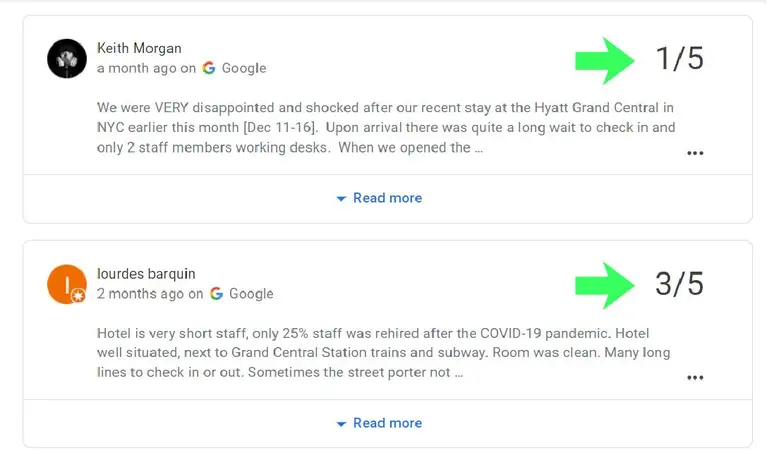
It creates a negative impression among the potential customers. Attend to all the queries and resolve them. It will improve your hotel’s brand reputation in the market.
So, how do unattended reviews affect your hotel’s local listing?
- Unattended reviews cast a negative light on the hotel and its reputation.
- Unattended reviews imply a lack of customer service.
- Due to unattended or bad reviews, Google may rank your hotel lower in the local SERPs.
What are the solutions to these problems?
- A prompt reaction to consumer inquiries and negative feedback demonstrates that the hotel values its customers.
- A well-maintained review area will provide transparency regarding your hotel and its services to visitors and potential customers. Because of this, Google will rank your hotel higher in local SERPs.
13. Not Buying Multiple Domains
Hotel business owners are still confused about maintaining multiple domains for their hotel website. Acquiring additional domains is optional and essential for hotels trying to improve their online visibility.
Hotel owners should have a clear strategy before owning multiple domains for their hotel website. If they want to set up an extra website for a specific market segment, then having multiple domains can help.
For example, a hotel can set up a dedicated website for their in-house restaurants or spa.
Take a look at this screenshot. Marriot is a world-known brand, hence apart from .com, they have purchased almost every possible domain to rank in all locations.

Benefits of having multiple domains?
- Multiple domains protect your hotel’s online presence and reputation.
- Multiple domains improve your hotel’s online reach among your target audience in the market.
Cons of having additional domains?
- You would not rank higher by acquiring multiple domains for your hotel website.
- There is a certainty of more traffic drive to your hotel website due to multiple domains.
14. Not using Social Media Platforms and YouTube as SEO tactics.
Social media platforms and YouTube are the most effective yet undervalued SEO tactics in the market. Social media platforms such as Instagram and Facebook are the perfect places to expand your hotel's online reach.
Social media platforms have millions of active and interested users to promote your hotel’s brand.
Hotel business owners usually neglect YouTube due to their lack of knowledge on its usage. Currently, YouTube is driving millions of users every day. Your hotel will have the necessary audience attention and market presence if it has a page with relevant videos on YouTube.
Also, with an increased number of travelers getting numerous attention through vlogging, help these hotels awareness through youtube. For example, take a look at this example:
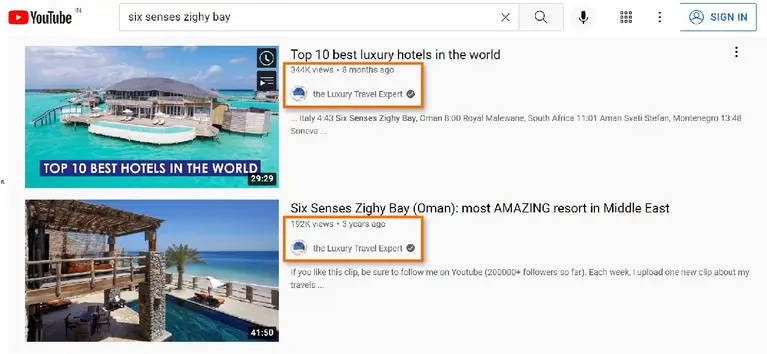
Let's discuss some popular tools to up your social media game for your hotel business.
- Buffer is a free tool to schedule and manage your social media posts and accounts.
- Buzzsumo enables you to keep track of your rival hotels’ social media activity and blog posts.
- Sumo is a tool that enables you to add social media sharing buttons to your blogs.
Key Takeaways
- Maintain an up-to-date Google My Business profile of your hotel/s.
- Claim your local listings and categorize your hotel under a relevant category.
- Provide relevant business information on your local listings.
- Provide NAP and Location Information on your hotel listings.
- Do your keyword research and come up with a hotel-specific keyword strategy.
- Outrank your competitors by being transparent and building trust among your audience.
- Create quality blog content on-site to improve user experience and crowd drive to your hotel website.
- Attend to genuine business feedback and resolve customer grievances to improve the market reputation of your hotel.
- Use social media platforms and YouTube to improve your online reach and brand visibility in the market.
ABOUT THE AUTHOR:
Brice Decker

Brice has been handling marketing projects for more than 12 years and he is providing consulting services on SEO, Social Media and PPC. He has a huge expertise in working at large corporations including Accenture Interactive & PwC Digital Services.
ABOUT THE AUTHOR:
Brice Decker

Brice has been handling marketing projects for more than 12 years and he is providing consulting services on SEO, Social Media and PPC. He has a huge expertise in working at large corporations including Accenture Interactive & PwC Digital Services.
Related Post
How to Rebrand Your Business Without Losing SEO?